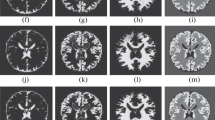Abstract
Image segmentation is an important research topic in image processing and computer vision community. In this paper, a new unsupervised method for MR brain image segmentation is proposed based on fuzzy c-means (FCM) and fuzzy connectedness. FCM is a widely used unsupervised clustering algorithm for pattern recognition and image processing problems. However, FCM does not consider the spatial coherence of images and is sensitive to noise. On the other hand, fuzzy connectedness method has achieved good performance for medical image segmentation. However, in the computation of fuzzy connectedness, one needs to select seeds manually which is elaborative and time-consuming. Our new method used FCM as the first step to select salient seeded points and then applied fuzzy connectedness algorithm based on those seeds. Thus our method achieved unsupervised automatic segmentation for brain MR images. Experiments on simulated and real data sets proved it is effective and robust to noise.
Preview
Unable to display preview. Download preview PDF.
Similar content being viewed by others
References
Udupa, J.K., Saha, P.K.: Fuzzy Connectedness and Imaging Segmentation. Proceedings of The IEEE 91(10), 1649–1669 (2003)
Saha, P.K., Udupa, J.K., Odhner, D.: Scale-based fuzzy connected image segmentation: Theory, algorithms, and validation. Computer Vision and Image Understanding 77, 145–174 (2000)
Dunn, J.C.: A Fuzzy Relative of the ISODATA Process and Its Use in Detecting Compact Well-Separated Clusters. Journal of Cybernetics 3, 32 (1973)
Bezdek, J.C.: Pattern Recognition with Fuzzy Objective Function Algorithms. Plenum, New York (1981)
Clark, M.C.: MRI segmentation using fuzzy clustering techniques. IEEE Engineering in Medicine and Biology 13(5), 730 (1994)
Rosenfeld, A.: Fuzzy digital topology. Information and Control 40(1), 76 (1979)
Udupa, J.K., Samarasekera, S.: Fuzzy Connectedness and Object Definition: Theory, Algorithms, and Applications in Image Segmentation. Graphical Model and Image Processing 58(3), 246 (1995)
Nyul, L.G., Udupa, J.K.: On standardizing the MR image intensity scale. Magn. Reson Med. 42, 1072–1081 (1999)
Dam, E.B.: Evaluation of diffusion schemes for multiscale watershed segmentation. MSC. Dissertation, University of Copenhagen (2000)
Zijdenbos, A.P., Dawant, B.M., Margolin, R.A., Palmer, A.C.: Morphometric analysis of white matter lesions in MR images: Method and validation. IEEE Transactions on Medical Imaging 13(4), 716 (1994)
Cocosco, C.A., Kollokian, V., Kwan, R.K.-S., Evans, A.C.: BrainWeb: Online Interface to a 3D MRI Simulated Brain Database. NeuroImage 5(4), part 2/4, S425 (1994)
Author information
Authors and Affiliations
Editor information
Editors and Affiliations
Rights and permissions
Copyright information
© 2005 Springer-Verlag Berlin Heidelberg
About this paper
Cite this paper
Fan, X., Yang, J., Cheng, L. (2005). A Novel Segmentation Method for MR Brain Images Based on Fuzzy Connectedness and FCM. In: Wang, L., Jin, Y. (eds) Fuzzy Systems and Knowledge Discovery. FSKD 2005. Lecture Notes in Computer Science(), vol 3613. Springer, Berlin, Heidelberg. https://doi.org/10.1007/11539506_64
Download citation
DOI: https://doi.org/10.1007/11539506_64
Publisher Name: Springer, Berlin, Heidelberg
Print ISBN: 978-3-540-28312-6
Online ISBN: 978-3-540-31830-9
eBook Packages: Computer ScienceComputer Science (R0)




